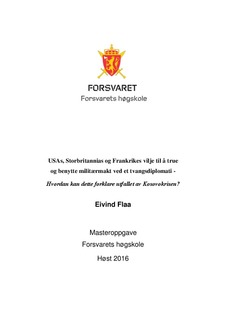| dc.contributor.author | Flaa, Eivind | |
| dc.date.accessioned | 2017-03-29T12:04:05Z | |
| dc.date.available | 2017-03-29T12:04:05Z | |
| dc.date.issued | 2016 | |
| dc.identifier.uri | http://hdl.handle.net/11250/2436205 | |
| dc.description.abstract | Formålet med denne oppgaven er å undersøke militærmaktens muligheter og begrensninger gjennom krisehåndteringsstrategien tvangsdiplomati, og finne svar på om trusselen om bruk av militærmakt og diplomatiske incentiver bidrar til politisk utfall mellom stater i internasjonal politikk.
I oppgaven har jeg undersøkt viljen til å true og benytte militærmakt blant de mest toneangivende tvangsstatene i Vesten (USA, Storbritannia og Frankrike) i forbindelse med tvangsdiplomatiet mot Serbia under Kosovokrisen i 1998-99.
Problemstillingen er: Hvordan kan USAs, Storbritannias og Frankrikes vilje til å true og benytte militærmakt forklare utfallet av Kosovokrisen?
For å besvar dette spørsmålet har jeg benyttet kvalitativ analyse av tvangsstatene langs tre variabler som tvangsdiplomatiteorien Ideal Policy hevder vil påvirke tvangstatenes vilje til å gjennomføre tvangsdiplomati, og dermed viljen til å true og bruke makt.
Analysen indikerer at tvangstatenes egeninteresse er avgjørende for om de er villige til å true og benytte militærmakt, men også at utsikten for en militær suksess og støtten i hjemlandet påvirker, og at variablene er drivere for hvilket tvangsmiddel statene er villige til true med.
Hovedkonklusjonen er at tvangsstatene hadde et interessedrevet mønster som den viktigste driveren for økt vilje til å true og benytte militærmakt. Dette skyldtes utviklingen i konflikten, og at dette utvidet mulige maktmidler så lenge det påvirket de strategiske egeninteressene. Årsaken til dette var at motparten, Serbia, ikke oppfattet trusselen på samme måte som tvangsstatene og dermed ikke reagerte på trusselen slik tvangsstatene forventet. Serbia var først villige til å gi etter da trusselen om økt maktbruk med bakkestyrker ble sannsynlig, og at trusselen først ble oppfattet som troverdig fra det øyeblikket. | nb_NO |
| dc.description.abstract | The purpose of this thesis is to examine opportunities and limitations of military force through coercive diplomacy, and find out whether a treat of use of military force and diplomatic incentives can contribute to political outcome in international politics.
In the thesis I have examined the will to threat and use military force of the states that “leads the fashion” among the coercive states of the West (USA, Great Britain and France) during the coercive diplomacy against Serbia during the Kosovo crisis in 1998-99.
The research question is: How can USA`s, Great Britain’s and France`s will to threat and execute military force explain the outcome of the Kosovo crisis?
To answer this question, I have used qualitative research analysis on three variables that the coercive diplomacy theory, Ideal Policy, claims to influence the coercive states` will to implement coercive diplomacy, and thereby the will to threat and use force.
The analysis indicates that the key variable interests of the coercive states is decisive for the will to threaten and use military force, but also that the prospects of military success and domestic support influence the coercive measures.
The main conclusion is that USA, Great Britain and France all had interest-driven will-producing patterns, and that the key variable was the main cause for the will to threat and use military force. The reason was the evolution of the conflict that expanded possible coercive measures as long as the evolution affected the coercive states’ strategic interests.
The opponent part, Serbia, did not perceive the threat in the same manner as the coercive states, and thus Serbia did not respond to the threat as expected. Serbia`s will to yield was first initiated when the coercive measures was possibly to be expanded to ground troops, and Serbia perceived the threat as credible. | |
| dc.language.iso | nob | nb_NO |
| dc.publisher | Forsvarets høgskole | nb_NO |
| dc.subject | tvangsdiplomati | nb_NO |
| dc.subject | krisehåndteringsstrategi | nb_NO |
| dc.subject | militærmakt | nb_NO |
| dc.subject | USA | nb_NO |
| dc.subject | Storbritannia | nb_NO |
| dc.subject | Frankrike | nb_NO |
| dc.subject | Kosovokrisen | nb_NO |
| dc.title | USAs, Storbritannias og Frankrikes vilje til å true og benytte militærmakt ved et tvangsdiplomati - Hvordan kan dette forklare utfallet av Kosovokrisen? | nb_NO |
| dc.type | Master thesis | nb_NO |
